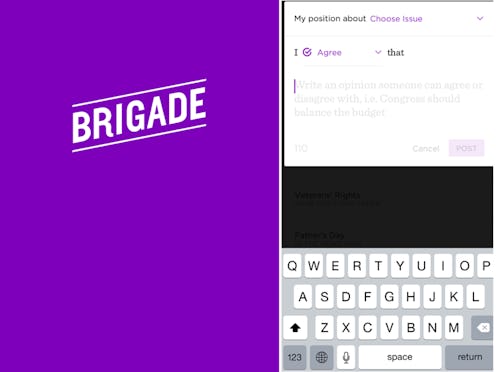News
Here's A Look At The "Tinder For Politics" App

What happens when you blend social media and politics? Usually, you get a long rant from your next-door neighbor's third cousin, but now, there's an app that could use social networking to build working political alliances. It's all about re-energizing democracy through grassroots organizing and the power of social networks, and here's what happened when I tried Brigade, the "Tinder for politics."
The app, released for beta testing last Wednesday, lets users post their opinions on trending political issues and connect with friends, colleagues, and people who share their interests. (Think Tinder without the hook-up factor and Yik Yak without the anonymous factor.)
"We want to make our democracy more vibrant, more participatory, and more responsive to the needs of ordinary citizens," said Brigade CEO Matt Mahan in a video on the company's blog. Mahan previously worked at Causes, an online platform and Facebook application that allows people to share the causes they're passionate about and organize with others. With this new venture, Mahan takes that concept mobile — Brigade is available for iPhone and Android devices currently.
Sean Parker, cofounder of Napster and the first president of Facebook, has already pitched in to support the concept, contributing to the $9.5 million that Brigade raised since April. In an interview with The Washington Post, Parker described Brigade as, "like a Tinder for politics." From what I can see, it's not quite there yet, but by the time it hits the general public, it probably will be.
Right off the bat, this app picks up a couple cool points for its gender-selection question. The app lets you pick how you want to be identified to other users, based on pronouns. Swipe right if you support gender equality.
Once you've registered, Brigade asks you to post your opinion about 10 political issues. To post your opinion, you click "Agree" or "Disagree" on a statement such as, "There is too much money in politics." You can scroll through numerous issues to find the ones that matter to you. Along with your vote, you can post a comment to explain your reasoning. If you're unsure about an issue but want to learn more, you can click "Unsure" and then one of the other choices to read why other people have agreed or disagreed.
Once you've voted on a particular post, you can see how your response compares to other users' responses. While voting on several different issues, I noticed that several — I want to say most, but I don't have precise data to back that up — of the issues had a consensus of 90 percent or more. Few of the issues I looked at showed a agree-disagree divide of more than 90-10 (or vice versa). The biggest gap I saw came in response to the position, "License plate messages are private speech protected by the First Amendment," where out of approximately 1,300 votes, 61 percent of users disagreed and only 39 percent agreed.
In addition to voting on issues in your feed, you can post your own positions. To do so, you choose from a set of issue categories, including abortion, food, and energy. Once you've chosen a category, you can briefly state your position on that issue, using 110 characters or less. You can post something you agree with or something you disagree with. It's an interesting way to have your voice heard, in exactly the words you want to use.
From your profile page, Brigade shows you how your political views as a whole compare to those of other users. Again, these numbers are likely to shrink as more and more people join the app, which is likely to spark more debate and, hopefully, more engagement with the issues at hand. As you connect with your friends on the app, you can see how you compare with them and you can become a "supporter" of their views and activities (think, following them on Instagram). You can also support and join campaigns that others are organizing. The hope is that as the app grows, people will be able to connect with each other to engage with issues they are passionate about. If the app inspires unity beyond the mobile device, that's even better.
It's obvious that this new app is just a starting point for Brigade. The app introduces users to a new concept of participatory democracy, which I hope future releases will improve upon. On its blog, Brigade announced that future tools will help users start their own groups with like-minded people and analytical tools for campaigns to gauge engagement with their issues and turn their online supporters into real-world activists. As with any social networking platform, the success of Brigade down the road could likely depend on how many people choose to use it and the level of their engagement.
Images: Alex Gladu/Bustle (6)